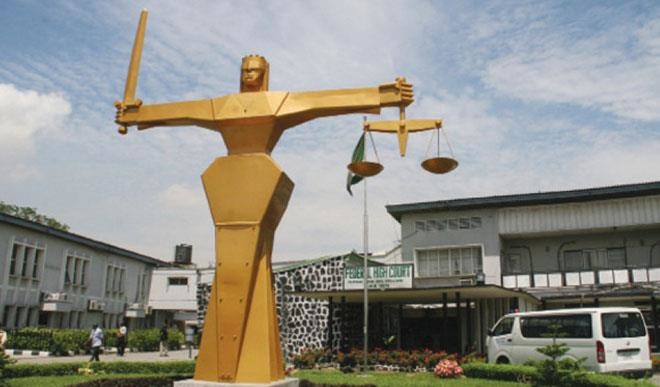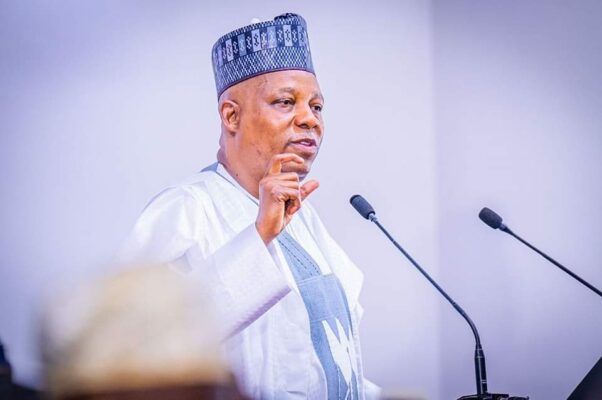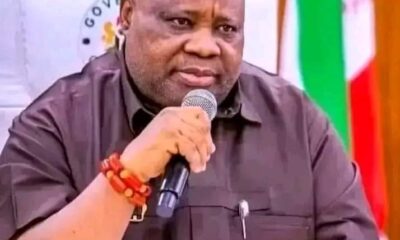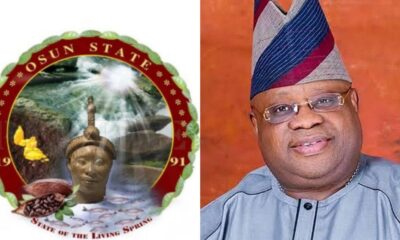News
Osun Guber: YIAGA’s revelations vindicate my position — Omipidan
Let me state from the outset that this is not a media trial of the case before the Osun Election Petitions Tribunal. Far from it. This is just an attempt to “synchronise” what I said recently with respect to the outcome of the July 16 election with the revelations from The Youth Initiative for Advocacy, Growth and Advancement, YIAGA.
YIAGA Africa is a civil society organisation, a major stakeholder in our electoral process. Like most Civil Society Organisations, CSOs, they were also in Osun to observe and monitor the election.
I said recently that my Principal, Governor Adegboyega Oyetola, did not lose the election but only lost the vote count. But a lot of people were wondering what point I was trying to make.
However, last Thursday’s revelations by YIAGA, where it submitted among other things, as reproduced below, is a vindication of my position:
“An analysis of the number of registered voters and the PVC collected by polling units revealed some inconsistencies in the data. Findings from the analysis on the Osun PVC collection data revealed that the total number of PVCs collected for 30 polling units was greater than the total number of registered voters in those polling units. These inconsistencies were recorded in 12 LGAs.”
Last Thursday, YIAGA Africa held a stakeholders’ conference where it launched the election result analysis dashboard (ERAD) report agenda.
It was at the event that the Chairman of the Independent National Electoral Commission, (INEC), Professor Mahmood Yakubu, revealed the alleged attempts by some hackers to hack into the INEC’s results viewing portal.
At the same event, YIAGA seized the opportunity to present to the gathering its findings on e-transmission of election results on the electronic transmission of results in the 2022 Osun and Ekiti governorship elections. But because I am discussing Osun here, I will only focus on Osun.
The Executive Director of YIAGA, Samson Itodo, according to reports from the event, noted that its organisation curated an Election Results Analysis Dashboard (ERAD) as an independent audit and integrity test assessment tool for the results management of INEC.
Mr. Itodo revealed that some “issues” in the Osun election affected the processing of results on the ERAD platform which, he noted, was targeted at providing credible information.
In the Osun election, he continued, eighty-seven (87) results were not processed on the ERAD, due to some issues.
“Based on ERAD findings, INEC presiding officers uploaded forms or documents other than Form EC8A as prescribed in the guidelines and manual for the election,” he added.
The YIAGA Executive Director further revealed that in Osun “Blurry images and poorly captured photographs of result sheets were uploaded on the IReV portal,” adding that “it was impracticable to decipher the number of votes scored by political parties on the uploaded forms. In some cases, the presiding officers uploaded truncated images of result sheets. In other words, the images omitted segments of the result sheets.”
Hear him further: “From the result sheets downloaded on the IReV, important delimitation data such as number of registered voters and accredited voters for polling units was either omitted or wrongly inputted on the Form EC8A.
“Contrary to the provisions of the electoral act 2022 and INEC guidelines and regulations, some polling unit level results (Form EC8A) uploaded on the IReV were not stamped or signed by the presiding officer.
“Based on results entered on the ERAD database, there was a variation in the total number of rejected ballots, and the figures announced by INEC at the final collation.”
YIAGA boss went further to submit that the ERAD’s findings exposed inconsistencies in the data on the Permanent Voter Card (PVC) collection, insisting that it was noticed across 12 Local Government Areas in Osun.
“An analysis of the number of registered voters and the PVC collected by polling units revealed some inconsistencies in the data. Findings from the analysis on the Osun PVC collection data revealed that the total number of PVCs collected for 30 polling units was greater than the total number of registered voters in those polling units. These inconsistencies were recorded in 12 LGAs,” he said.
As a political reporter who has covered elections in our clime, I was surprised that the revelations from YIAGA were not critically analysed by the stakeholders at the event. Or maybe it was but it did not get media attention. Regardless, as someone who had attended INEC’s chairman engagements with the media in the past, such revelations would not pass without the INEC boss making a comment even if it is in passing.
But if indeed, he did, I am yet to read it anywhere as at this morning when I penned down my thoughts on the event. Our case before the Tribunal is simple.
Sections 47(2) of the Electoral Act says that to vote, the presiding officer shall use the smart card reader or any other technological device that maybe prescribed by the commission for the accreditation of voters to “verify, authenticate the intending voter in the manner prescribed by the commission.”
For the purpose of Osun election, INEC had prescribed the BVAS (Bimodal Voters Accreditation System) as the only credible means of accreditation. But from the report we got from the field, in many of the polling units, BVAS was not used appropriately. It didn’t capture the number of accredited voters. But we did not rely mainly on the report we got from our poling agents . We also demanded by law for a CTC of the report of BVAS from INEC, and we got it.
The CTC of the report of BVAS across 10 Local Governments in 749 polling units showed that accreditation through BVAS was less than the number of votes cast in those units.
By implication, there were more voters than accredited by the BVAS. Let me give a few examples to drive home my point.
In Ede-North ward 5, Alusekere Unit 004, Owode Primary School, where the governor-elect comes from, the total votes cast for that unit was 1,267 but BVAS recorded only 858 as accredited voters.
Again, in Ward 5 unit 14, 206 number of votes were recorded for parties against 118 accredited through BVAS. In Unit 15 of the same ward 5 Alusekere, 177 votes were recorded in Form EC8A while the BVAS report says 108 voters were accredited. So, consistently, there were more voters than BVAS accredited, and those are our issues with the Election Results as declared by INEC. (See attached pictures).
Make no mistake, our case is not in any way an attempt to impugn on the integrity of INEC. Far from it. It is to further help deepen our electoral system and to help INEC correct whatever anomalies arising from the Osun Governorship Election ahead of 2023 elections. Most of the reforms we have today were borne out of the decisions of the court. Our observations may as well be part of them.
News
Yahaya Bello: Court orders EFCC boss, Olukoyede to appear over alleged contempt


A Kogi High Court in Lokoja on Friday ordered the Chairman of the EFCC, Mr Ola Olukoyede, to appear before it on May 13 to show why he should not be committed for allegedly disobeying its order.
Justice I.A. Jamil of High Court IV gave the order while ruling in Suit No: HCL/68M/2024 and Motion No: HCL/190M/2024, brought before him by ex-Gov. Yahaya Bello of Kogi in Lokoja.
“The said act was carried out by the Respondent (EFCC) in violation of the order, which was valid and subsisting when they carried out the act.
“That same act of the respondent amounts to contempt, ” the judge said.
The News Agency of Nigeria (NAN) reports that the EFCC boss is facing a contempt charge for allegedly carrying out “some acts upon which they (the EFCC) have been restrained” by the court on Feb. 9, pending the determination of the substantive originating motion.
EFCC operatives had on April 17 laid siege on the residence of the former governor, Alhaji Yahaya Bello, in a bid to arrest him, in spite a court order restraining them from taking such action, pending the determination of the originating motion.
Justice Jamil’s order was based on a motion ex-parte filed by Yahaya Bello through his lawyer, M.S. Yusuf.
Bello prayed the court for an order to issue and serve the respondent (EFCC Chairman) with Form 49 Notice to show cause why Order of Committal should not be made on Olukoyede.
“The Judge, after listening to the arguments of the applicant’s counsel, the submission and exhibits attached in the written address, granted Bello’s prayers and ordered Olukoyede to be summoned to appear before the court to answer the contempt charge.
“The applicant’s application before me is to the effect that the respondent has carried out some acts upon which they have been restrained by this court on Feb. 9, pending the determination of the substantive motion on notice before this court.
“That the said act was carried out by the respondent in violation of the order which was valid and subsisting when they carried out those acts. That same act of the respondent amounts to act of contempt.
“It’s against the above facts that this Court hereby grants the prayers sought in line with the principle of “Audi Ultra Patem” (listen to the other side).
“This matter is adjourned to May 13 for the respondent’s chairman to appear before this court in answer to form 49 ordered to be served on him,” the Judge said.
News
Tinubu appoints heads of NESREA, NDRBDA


President Bola Tinubu has approved the appointment of Dr Innocent Barikor as the Director-General of the National Environmental Standards and Regulation Enforcement Agency (NESREA).
Chief Ajuri Ngelale, Special Adviser to the President on Media and Publicity, disclosed this in a statement on Friday in Abuja.
The President also approved the appointment of Prince Ebitimi Amgbare as the Managing Director/CEO of the Niger Delta River Basin Development Authority (NDRBDA).
Barikor is an academic, politician and a member of the Rivers State House of Assembly from 2011 to 2015, while Prince Amgbare is a retired naval officer and former commissioner in Bayelsa.
He said that the President expected that the new heads of these important agencies to discharge their duties with utmost fidelity to the nation.
Ngelale also stated that the President called on the new appointees to adhere to the highest standards of professionalism, accountability, and excellent service to the people of Nigeria.
News
NCP approves recommendation to reposition BOA


By Matthew Denis
The National Council on Privatisation (NCP) has given its nod to the recommendations aimed at repositioning the Bank of Industry (BOA) to ensure food security for Nigerians.
Chaired by the Vice President, Sen. Kashim Shettima, the NCP approved the recommendations from the committee on BOA during its second meeting of 2024 held on Wednesday, April 24, 2024, at the Presidential Villa Abuja.
Speaking during the meeting, the Vice President emphasized the importance of optimizing BOA as part of the administration’s agenda to provide food security for the nation. He urged the committee to engage professionals with integrity to manage the process effectively.
Presenting the committee’s report, the Minister of Finance and Coordinating Minister of the Economy, Mr. Wale Edun, who is also the Vice-chairman of the NCP, highlighted the decision to reposition BOA for efficiency and effectiveness. He expressed confidence that the recommendations would guide the Council in revitalizing the Bank of Agriculture and positioning it globally.
One of the Key recommendations includes upgrading the Bank’s ICT infrastructure to automate processes and ensure accountability.
Recall that in 2023, an 8-member inter-ministerial team was set up by the NCP to review the state of affairs at BOA, given its critical role in agriculture and the administration’s commitment to food security. Additionally, in 2016, the NCP approved collaboration between the Bureau of Public Enterprises and the Federal Ministry of Agriculture and Rural Development, along with the Federal Ministry of Finance, to restructure and recapitalize BOA.
Established in 1972, BOA, formerly known as Nigeria Agricultural Cooperative and Rural Development Bank, is owned by the Federal Government of Nigeria (FGN), with the Ministry of Finance Incorporated (MOFI) holding 60% and the Central Bank of Nigeria (CBN) holding 40%.
The Bank is supervised by the Federal Ministry of Agriculture and Food Security (FMAFS).
BOA’s authorized share capital was increased in 2022 from N50 billion to N500 billion to facilitate its repositioning.
The committee, comprising the Minister of Finance & Coordinating Minister of the Economy as Chairman, Minister of Agriculture and Food Security, Governor of CBN, Ministry of Finance Incorporated (MOFI), Mr. Mohammed Mustapha Bintube, Chairman of the Technical Committee of the NCP, Chairman of the Legal Committee of NCP, and Director General of the Bureau of Public Enterprises (BPE) as the secretary, worked diligently to arrive at these recommendations.
In another development, the NCP also noted a proposal for the establishment of an independent system operator from the Transmission Company of Nigeria (TCN) to enhance efficiency in the nation’s power sector.
-
Finance3 months ago
Court orders Sen. Victor Umeh to repay N136m bank debt to AMCON
-



 Abuja Update2 months ago
Abuja Update2 months agoUNDP, FG partnership needed to achieve inclusion, equity- Minister
-
Abuja Update1 month ago
Banks drive stock market performance with N147bn gain
-



 Infotech4 weeks ago
Infotech4 weeks agoWorld Backup Day: NITDA urges Nigerians to ensure backup of data
-



 Health1 week ago
Health1 week agoCapacity training will reduce migration of health workers- NPHCDA
-
capital market2 years ago
Rt.briscoe, FBNH, Others halts negative performance of stock market
-



 Health3 weeks ago
Health3 weeks agoImmunisation: FG, GAVI seek synergy with Sokoto Govt.
-
Infotech2 weeks ago
Forex for Beginners: Unveiling the currency exchange and how to trade it








